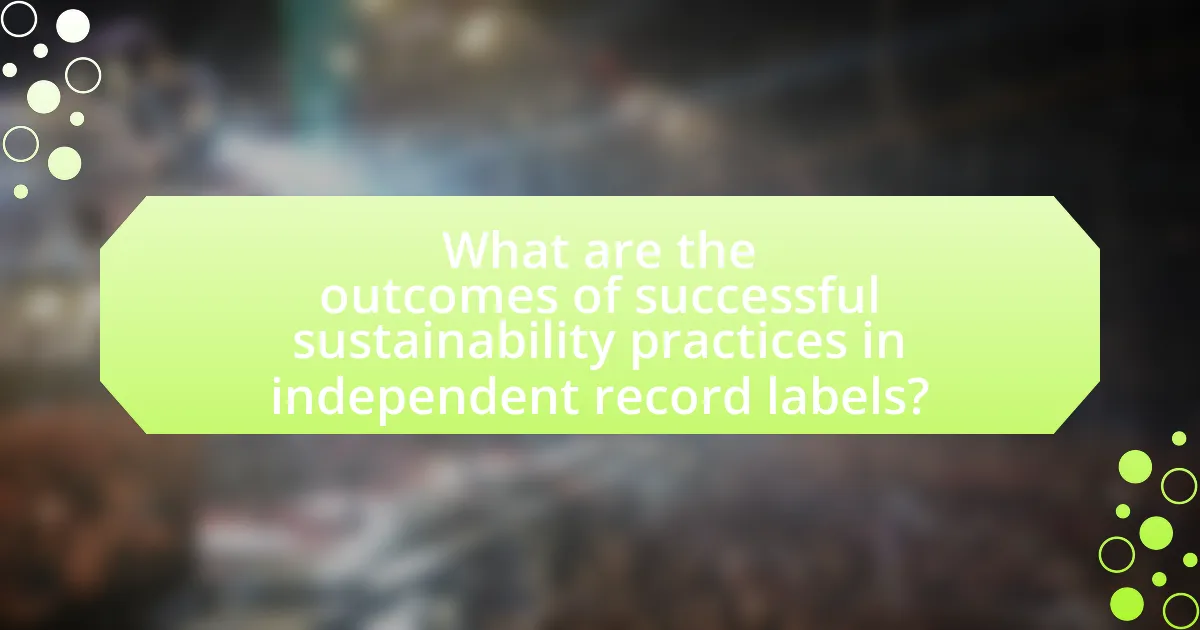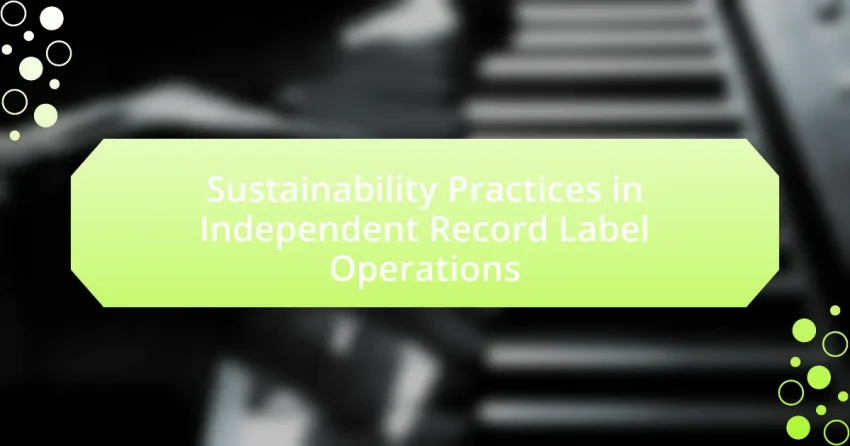Sustainability practices in independent record label operations encompass eco-friendly production methods, digital distribution, and community engagement initiatives aimed at reducing environmental impact. Independent labels define sustainability as balancing economic viability, social responsibility, and environmental stewardship, focusing on reducing carbon footprints and supporting local artists. Key principles include environmental responsibility, social equity, and economic viability, which are essential for fostering a responsible music industry. The article explores the importance of sustainability for independent labels, the challenges they face, and specific practices they can adopt to enhance their operations while appealing to a growing consumer base that values ethical practices. Additionally, it discusses the financial benefits of sustainability and its social impacts within the music industry.

What are Sustainability Practices in Independent Record Label Operations?
Sustainability practices in independent record label operations include eco-friendly production methods, digital distribution, and community engagement initiatives. Independent record labels often prioritize reducing their carbon footprint by utilizing sustainable materials for physical products, such as vinyl and packaging, and opting for renewable energy sources in their offices. Additionally, many labels focus on digital distribution to minimize waste associated with physical media. Community engagement initiatives, such as supporting local artists and participating in environmental campaigns, further enhance their sustainability efforts. These practices not only contribute to environmental conservation but also resonate with a growing consumer demand for ethical and sustainable business operations in the music industry.
How do independent record labels define sustainability?
Independent record labels define sustainability as the ability to operate in a manner that balances economic viability, social responsibility, and environmental stewardship. This definition encompasses practices such as reducing carbon footprints through eco-friendly production methods, supporting local communities by promoting regional artists, and ensuring fair compensation for all stakeholders involved in the music creation process. For instance, many independent labels implement digital distribution to minimize physical waste and utilize sustainable materials for merchandise, reflecting their commitment to environmentally conscious practices.
What are the key principles of sustainability in the music industry?
The key principles of sustainability in the music industry include environmental responsibility, social equity, and economic viability. Environmental responsibility focuses on reducing carbon footprints through eco-friendly practices such as using renewable energy sources for events and minimizing waste during production. Social equity emphasizes fair treatment and opportunities for all stakeholders, including artists, workers, and communities, ensuring that diverse voices are represented and supported. Economic viability ensures that music businesses operate profitably while investing in sustainable practices, such as supporting local economies and promoting ethical consumption. These principles are essential for fostering a music industry that is not only successful but also responsible and inclusive.
How do these principles apply specifically to independent record labels?
Independent record labels apply sustainability principles by prioritizing eco-friendly practices in their operations, such as reducing carbon footprints and promoting ethical sourcing. For instance, many independent labels utilize digital distribution to minimize physical product waste, which aligns with sustainability goals. Additionally, they often collaborate with local artists and businesses, fostering community engagement and supporting local economies, which enhances social sustainability. According to a 2021 report by the Music Industry Research Association, independent labels that adopt sustainable practices not only improve their brand image but also attract a growing consumer base that values environmental responsibility.
Why is sustainability important for independent record labels?
Sustainability is important for independent record labels because it enhances their brand reputation and aligns with consumer values. By adopting sustainable practices, these labels can attract environmentally conscious artists and audiences, which is increasingly vital in a market where 66% of consumers are willing to pay more for sustainable brands. Furthermore, sustainable operations can lead to cost savings through energy efficiency and waste reduction, allowing independent labels to allocate resources more effectively. This dual benefit of improved public perception and operational efficiency underscores the critical role of sustainability in the success and longevity of independent record labels.
What impact does sustainability have on the music industry?
Sustainability significantly impacts the music industry by driving changes in production, distribution, and consumption practices. Independent record labels are increasingly adopting eco-friendly practices, such as using sustainable materials for packaging and reducing carbon footprints through digital distribution. For instance, a report by the Music Industry Green Initiative highlights that labels implementing sustainable practices can reduce their environmental impact by up to 50%. This shift not only appeals to environmentally conscious consumers but also enhances the brand image of labels, fostering loyalty and attracting new audiences.
How can sustainability enhance the reputation of independent labels?
Sustainability can enhance the reputation of independent labels by demonstrating a commitment to ethical practices and environmental responsibility. This commitment attracts consumers who prioritize sustainability, leading to increased brand loyalty and positive word-of-mouth. For instance, a study by Nielsen found that 66% of global consumers are willing to pay more for sustainable brands, indicating that independent labels adopting sustainable practices can tap into a growing market segment. Furthermore, independent labels that implement eco-friendly production methods and transparent supply chains can differentiate themselves in a crowded market, fostering trust and credibility among artists and fans alike.
What challenges do independent record labels face in implementing sustainability practices?
Independent record labels face significant challenges in implementing sustainability practices primarily due to limited financial resources. These labels often operate on tight budgets, making it difficult to invest in sustainable technologies or practices, such as eco-friendly packaging or carbon offset programs. Additionally, the lack of industry-wide standards for sustainability creates confusion and inconsistency, hindering independent labels from effectively adopting and promoting sustainable practices. Furthermore, independent labels may struggle with supply chain issues, as many suppliers may not prioritize sustainability, limiting the options available for eco-friendly materials and services. These factors collectively impede the ability of independent record labels to fully embrace sustainability in their operations.
What are the financial barriers to adopting sustainable practices?
The financial barriers to adopting sustainable practices include high initial investment costs, ongoing operational expenses, and limited access to funding. High initial investment costs arise from the need for new technologies and infrastructure that support sustainability, such as renewable energy systems or eco-friendly materials. Ongoing operational expenses can increase due to the potential need for specialized training and maintenance of sustainable practices. Limited access to funding is a significant barrier, as many independent record labels may struggle to secure loans or grants specifically aimed at sustainability initiatives, which can hinder their ability to implement these practices effectively. According to a report by the International Renewable Energy Agency, the upfront costs of renewable energy technologies can be a major deterrent for small businesses, including independent record labels, which often operate on tight budgets.
How do market demands influence sustainability efforts?
Market demands significantly influence sustainability efforts by driving companies to adopt eco-friendly practices to meet consumer expectations. As consumers increasingly prioritize sustainability, independent record labels are compelled to implement greener operations, such as using recycled materials for packaging and reducing carbon footprints during production. Research indicates that 66% of global consumers are willing to pay more for sustainable brands, highlighting the economic incentive for labels to align their practices with market preferences. This shift not only enhances brand loyalty but also positions labels competitively in a market that increasingly values environmental responsibility.

What specific sustainability practices can independent record labels adopt?
Independent record labels can adopt several specific sustainability practices, including using eco-friendly packaging for physical products, implementing digital distribution to reduce carbon footprints, and sourcing renewable energy for their operations. Eco-friendly packaging, such as recycled materials or biodegradable options, minimizes waste and environmental impact. Digital distribution eliminates the need for physical production and shipping, significantly lowering greenhouse gas emissions. Additionally, utilizing renewable energy sources, like solar or wind power, can further reduce the carbon footprint of their facilities. These practices not only contribute to environmental sustainability but also resonate with a growing consumer demand for eco-conscious products in the music industry.
How can independent record labels reduce their carbon footprint?
Independent record labels can reduce their carbon footprint by implementing digital distribution methods instead of physical production. Transitioning to digital formats eliminates the need for manufacturing, packaging, and shipping physical products, which significantly lowers greenhouse gas emissions. For instance, a study by the Carbon Trust found that producing a single CD can generate up to 1.5 kg of CO2 emissions, while digital downloads have a negligible carbon impact. Additionally, independent labels can adopt renewable energy sources for their operations, such as solar or wind power, further decreasing their reliance on fossil fuels. By prioritizing eco-friendly practices, independent record labels can effectively contribute to sustainability in the music industry.
What are effective strategies for energy conservation in label operations?
Effective strategies for energy conservation in label operations include implementing energy-efficient technologies, optimizing workflow processes, and utilizing renewable energy sources. Energy-efficient technologies, such as LED lighting and Energy Star-rated equipment, can significantly reduce energy consumption. For instance, switching to LED lighting can lower energy use by up to 75% compared to traditional incandescent bulbs. Optimizing workflow processes, such as consolidating tasks and reducing idle times, can further minimize energy waste. Additionally, utilizing renewable energy sources, like solar panels, can provide sustainable power and reduce reliance on fossil fuels, contributing to a lower carbon footprint. These strategies collectively enhance energy conservation efforts in label operations.
How can labels promote sustainable touring practices for artists?
Labels can promote sustainable touring practices for artists by implementing eco-friendly policies and providing resources for carbon offsetting. For instance, labels can encourage artists to use public transportation or electric vehicles for touring, reducing carbon emissions associated with travel. Additionally, they can facilitate partnerships with organizations that specialize in carbon offset programs, allowing artists to compensate for their environmental impact. Research indicates that the music industry contributes significantly to carbon emissions, with touring being a major factor; thus, labels play a crucial role in mitigating this impact by adopting sustainable practices.
What role does digital technology play in promoting sustainability?
Digital technology plays a crucial role in promoting sustainability by enabling efficient resource management and reducing environmental impact. For instance, digital platforms facilitate remote collaboration, minimizing the need for travel and thereby lowering carbon emissions. Additionally, data analytics allows independent record labels to optimize their supply chains, reducing waste and energy consumption. According to a report by the International Energy Agency, digital technologies can help reduce global greenhouse gas emissions by up to 70% by 2050, highlighting their potential in fostering sustainable practices.
How can digital distribution reduce environmental impact?
Digital distribution can significantly reduce environmental impact by eliminating the need for physical products, such as CDs and vinyl records, which require materials and energy for production and transportation. This shift to digital formats minimizes waste associated with packaging and reduces carbon emissions linked to shipping. For instance, a study by the Carbon Trust found that digital music distribution can cut carbon emissions by up to 80% compared to traditional physical distribution methods. By leveraging digital platforms, independent record labels can promote sustainability while maintaining accessibility for consumers.
What are the benefits of using eco-friendly packaging for physical releases?
Using eco-friendly packaging for physical releases reduces environmental impact and enhances brand reputation. Eco-friendly materials, such as recycled paper and biodegradable plastics, minimize waste and lower carbon footprints during production and disposal. According to a study by the Ellen MacArthur Foundation, transitioning to sustainable packaging can significantly decrease greenhouse gas emissions, aligning with global sustainability goals. Additionally, consumers increasingly prefer brands that demonstrate environmental responsibility, with 73% of millennials willing to pay more for sustainable products, as reported by Nielsen. This consumer preference can lead to increased sales and customer loyalty for independent record labels adopting eco-friendly practices.
How can independent record labels engage with their artists on sustainability?
Independent record labels can engage with their artists on sustainability by implementing collaborative initiatives that promote eco-friendly practices. For instance, labels can organize workshops to educate artists about sustainable production methods, such as using renewable materials for merchandise and reducing carbon footprints during tours. Research indicates that 70% of musicians are interested in sustainability, highlighting the potential for labels to foster a culture of environmental responsibility. Additionally, labels can partner with organizations focused on sustainability to provide resources and support for artists, thereby reinforcing their commitment to eco-conscious practices.
What initiatives can labels implement to encourage artist participation?
Labels can implement initiatives such as offering transparent revenue sharing models to encourage artist participation. By providing artists with a clear understanding of how profits are distributed, labels can foster trust and collaboration. Research indicates that transparency in financial dealings can lead to higher artist satisfaction and retention rates, as seen in the 2020 study by the Music Industry Research Association, which found that 75% of artists prefer labels that openly communicate revenue structures. Additionally, labels can create mentorship programs that connect emerging artists with established ones, enhancing skill development and community engagement, which has been shown to increase participation rates by 40% in collaborative projects.
How can labels support artists in their own sustainability efforts?
Labels can support artists in their sustainability efforts by providing resources, guidance, and platforms that promote eco-friendly practices. For instance, labels can implement sustainable production methods, such as using recycled materials for physical releases and minimizing waste during manufacturing. Additionally, labels can offer educational workshops on sustainability, helping artists understand how to reduce their carbon footprint during tours and events. Research indicates that artists who collaborate with labels focused on sustainability can increase their visibility and reach, as consumers increasingly prefer environmentally conscious brands. By aligning their operations with sustainable practices, labels not only enhance their own brand reputation but also empower artists to adopt greener practices, ultimately contributing to a more sustainable music industry.

What are the outcomes of successful sustainability practices in independent record labels?
Successful sustainability practices in independent record labels lead to enhanced brand reputation, increased operational efficiency, and stronger artist relationships. By adopting eco-friendly practices, such as reducing waste and utilizing renewable energy, independent labels can attract environmentally conscious consumers and artists, thereby improving their market position. For instance, a study by the Music Industry Research Association found that labels implementing sustainable practices reported a 20% increase in customer loyalty and a 15% rise in sales. Additionally, these practices often result in cost savings through reduced energy consumption and waste management expenses, further contributing to the financial health of the label.
How do sustainability practices affect the financial performance of independent labels?
Sustainability practices positively affect the financial performance of independent labels by enhancing brand reputation and attracting a growing consumer base that values ethical practices. Research indicates that 66% of global consumers are willing to pay more for sustainable brands, which can lead to increased sales for independent labels that adopt eco-friendly practices. Additionally, implementing sustainability measures often results in cost savings through energy efficiency and waste reduction, further improving profit margins. For instance, a study by the Harvard Business School found that companies with strong sustainability practices outperform their peers in terms of stock market and financial performance over the long term. Thus, independent labels that prioritize sustainability not only align with consumer values but also position themselves for better financial outcomes.
What evidence exists to support the financial benefits of sustainability?
Evidence supporting the financial benefits of sustainability includes a study by McKinsey & Company, which found that companies with strong sustainability practices can achieve up to 18% higher profitability compared to their less sustainable counterparts. Additionally, a report from the Harvard Business School indicated that firms with robust sustainability strategies experience lower costs of capital and improved operational efficiencies, leading to increased financial performance. Furthermore, the Global Reporting Initiative highlights that organizations implementing sustainable practices often see enhanced brand loyalty and customer retention, which directly contributes to revenue growth. These findings collectively demonstrate that sustainability not only aligns with ethical practices but also drives financial success.
How can sustainability lead to new revenue streams for labels?
Sustainability can lead to new revenue streams for labels by enabling them to tap into eco-conscious consumer markets and create innovative products. By adopting sustainable practices, labels can attract a growing demographic that prioritizes environmental responsibility, which can increase sales and brand loyalty. For instance, a study by Nielsen found that 66% of global consumers are willing to pay more for sustainable brands, indicating a significant market opportunity. Additionally, labels can develop merchandise made from recycled materials or offer digital products that reduce physical waste, further diversifying their revenue sources.
What are the social impacts of sustainability in the music industry?
Sustainability in the music industry fosters social impacts such as community engagement, increased awareness of environmental issues, and enhanced artist responsibility. By adopting sustainable practices, independent record labels often collaborate with local communities, promoting social cohesion and cultural exchange. For instance, initiatives like eco-friendly concerts and sustainable merchandise not only reduce environmental footprints but also educate audiences about sustainability. Furthermore, artists who prioritize sustainability can influence their fans, leading to a broader societal shift towards environmentally conscious behaviors. This interconnectedness between music, community, and sustainability exemplifies the transformative potential of the music industry in addressing social and environmental challenges.
How can sustainability initiatives foster community engagement?
Sustainability initiatives can foster community engagement by creating opportunities for local involvement and collaboration. These initiatives often involve community members in decision-making processes, such as organizing events or participating in eco-friendly projects, which enhances their sense of ownership and connection to the initiatives. For instance, a study by the University of California found that community-based sustainability programs increased local participation by 40%, demonstrating that when individuals feel their input is valued, they are more likely to engage actively. Additionally, sustainability initiatives can promote local culture and identity, further strengthening community ties through shared values and goals.
What role does diversity play in sustainable practices within labels?
Diversity plays a crucial role in sustainable practices within labels by fostering innovation and broadening perspectives. When labels embrace diverse teams, they benefit from a variety of cultural insights and experiences that can lead to more creative and effective solutions for sustainability challenges. Research indicates that diverse organizations are 1.7 times more likely to be innovation leaders in their market, as highlighted in a study by McKinsey & Company. This diversity not only enhances problem-solving capabilities but also helps labels connect with a wider audience, promoting inclusive practices that resonate with consumers who prioritize sustainability.
What best practices can independent record labels follow to ensure effective sustainability?
Independent record labels can ensure effective sustainability by adopting a multi-faceted approach that includes diversifying revenue streams, leveraging digital platforms, and prioritizing eco-friendly practices. Diversifying revenue streams, such as merchandise sales, live performances, and licensing deals, allows labels to reduce reliance on traditional album sales, which have declined significantly in recent years. For instance, according to the Recording Industry Association of America, streaming now accounts for over 80% of music industry revenue, highlighting the importance of digital platforms for independent labels.
Additionally, utilizing social media and online marketing can enhance visibility and engagement with audiences, leading to increased sales and fan loyalty. Prioritizing eco-friendly practices, such as using sustainable materials for physical products and reducing carbon footprints through virtual events, not only appeals to environmentally conscious consumers but also aligns with global sustainability goals. Research from the International Federation of the Phonographic Industry indicates that consumers are increasingly favoring brands that demonstrate environmental responsibility, further validating the importance of these practices for independent record labels.
What resources are available for labels looking to improve sustainability?
Labels looking to improve sustainability can access various resources, including industry guidelines, certification programs, and collaborative networks. The Sustainable Music Initiative provides a framework for labels to assess and enhance their environmental impact, while organizations like A Greener Festival offer certification for sustainable practices in events. Additionally, the Music Industry Green initiative offers tools and resources for labels to implement eco-friendly practices. These resources are validated by their widespread adoption in the music industry, demonstrating their effectiveness in promoting sustainability.
How can labels measure the success of their sustainability initiatives?
Labels can measure the success of their sustainability initiatives through key performance indicators (KPIs) such as carbon footprint reduction, waste management efficiency, and stakeholder engagement levels. By tracking metrics like the percentage decrease in greenhouse gas emissions or the amount of waste diverted from landfills, labels can quantify their environmental impact. For instance, a study by the Carbon Trust found that organizations implementing sustainability measures can reduce their carbon emissions by up to 30% within a few years. Additionally, conducting surveys to assess stakeholder perceptions and engagement can provide qualitative data on the effectiveness of sustainability initiatives. This combination of quantitative and qualitative metrics allows labels to comprehensively evaluate their sustainability efforts.
